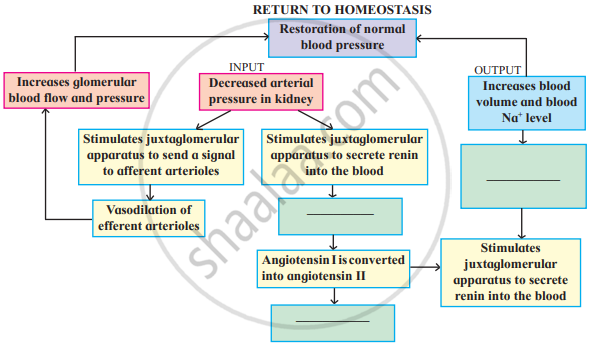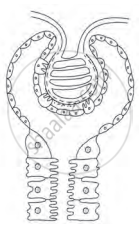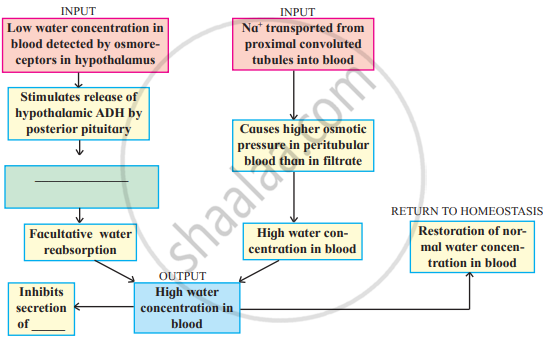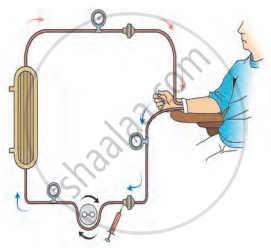Advertisements
Online Mock Tests
Chapters
2: Systematics of Living Organisms
3: Kingdom Plantae
4: Kingdom Animalia
5: Cell Structure and Organization
6: Biomolecules
7: Cell Division
8: Plant Tissues and Anatomy
9: Morphology of Flowering Plants
10: Animal Tissue
11: Study of Animal Type : Cockroach
12: Photosynthesis
13: Respiration and Energy Transfer
14: Human Nutrition
▶ 15: Excretion and Osmoregulation
16: Skeleton and Movement
![Balbharati solutions for Biology [English] 11 Standard Maharashtra State Board chapter 15 - Excretion and Osmoregulation Balbharati solutions for Biology [English] 11 Standard Maharashtra State Board chapter 15 - Excretion and Osmoregulation - Shaalaa.com](/images/biology-english-11-standard-maharashtra-state-board_6:541650b8500449e89d279e995538873a.jpg)
Advertisements
Solutions for Chapter 15: Excretion and Osmoregulation
Below listed, you can find solutions for Chapter 15 of Maharashtra State Board Balbharati for Biology [English] 11 Standard Maharashtra State Board.
Balbharati solutions for Biology [English] 11 Standard Maharashtra State Board 15 Excretion and Osmoregulation Exercise [Pages 190 - 192]
Choose the correct option.
Which one of the following organisms would spend maximum energy in the production of nitrogenous waste?
Polar bear
Flamingo
Frog
Shark
Choose the correct option.
In human beings, uric acid is formed due to metabolism of ______.
amino acids
fatty acids
creatinine
nucleic acids
Choose the correct option.
Visceral layer : Podocytes :: PCT : ________.
Cilliated cells
Squamous cells
Columnar cells
Cells with brush border
Choose the correct option.
Deproteinised plasma is not found in ______.
Bowman's capsule
Descending limb
Glomerular capillaries
Ascending limb
Choose the correct option.
Specific gravity of urine would _______ if level of ADH increases.
remain unaffected
increases
decreases
stabilise
Choose the correct option.
What is micturition?
Urination
Urine formation
Uremia
Urolithiasis
Choose the correct option.
Which one of the following organisms excrete waste through nephridia?
Cockroach
Earthworm
Crab
Liver Fluke
Choose the correct option.
Person suffering from kidney stone is advised not to have tomatoes as it has _______.
seeds
lycopene
oxalic acid
sour taste
Choose the correct option.
Tubular secretion does not take place in ______.
DCT
PCT
collecting duct
Henle's loop
Choose the correct option.
The minor calyx _______.
collects urine
connects pelvis to ureter
is present in the cortex
receives column of Bertini
Choose the correct option.
Which one of the following is not a part of human kidney?
Malpighian body
Malpighian tubule
Glomerulus
Loop of Henle
Choose the correct option.
The yellow colour of the urine is due to presence of ________.
uric acid
cholesterol
urochrome
urea
Hypotonic filtrate is formed in _______.
PCT
DCT
LoH
CT
Choose the correct option.
In reptiles, uric acid is stored in ______.
cloaca
fat bodies
liver
anus
Choose the correct option.
The part of nephron which absorbs glucose and amino acid is ______.
collecting tubule
proximal tubule
Henle's loop
DCT
Choose the correct option.
Bowman’s capsule is located in kidney in the _______.
cortex
medulla
pelvis
pyramids
Choose the correct option.
The snakes living in desert are mainly ______.
aminotelic
ureotelic
ammonotelic
uricotelic
Choose the correct option.
Urea is a product of breakdown of ______.
fatty acids
amino acids
glucose
fats
Choose the correct option.
Volume of the urine is regulated by ______.
aldosterone
ADH
both aldosterone and ADH
none
Answer the following question.
Doctors say Mr. Shaikh is suffering from urolithiasis. How it could be explained in simple words?
Answer the following question.
Anitaji needs to micturate several times and feels very thirsty. This is an indication of change in permeability of certain part of nephron. Which is this part?
Answer the following question.
Effective filtration pressure was calculated to be 20 mmHg; where glomerular hydrostatic pressure was 70 mm of Hg. Which other pressure is affecting the filtration process? How much is it?
Answer the following question.
Name any one guanotelic organism.
Answer the following question.
Why are kidneys called 'retroperitoneal'?
Answer the following question.
State the role of liver in urea production.
Answer the following question.
Why do we get bad breath after eating garlic or raw onion?
Answer the following question.
John has two options as a treatment for his renal problem: Dialysis or kidney transplants. Which option should he choose? Why?
Answer the following question.
Amphibian tadpole can afford to be ammonotelic. Justify.
Answer the following question.
Birds are uricotelic in nature. Give reason.
Write the explanation in your words.
Nitya has been admitted to hospital after heavy blood loss. Till proper treatment could be given; how did Nitya's body must have tackled the situation?
Complete the diagram/chart with correct labels/ information. Write the conceptual details regarding it.

Complete the diagram/chart with correct labels/ information. Write the conceptual details regarding it.

Complete the diagram/chart with correct labels/ information. Write the conceptual details regarding it.

Complete the diagram/chart with correct labels/ information. Write the conceptual details regarding it.

Complete the diagram/chart with correct labels/ information. Write the conceptual details regarding it.

Prove that mammalian urine contains urea.
Solutions for 15: Excretion and Osmoregulation
![Balbharati solutions for Biology [English] 11 Standard Maharashtra State Board chapter 15 - Excretion and Osmoregulation Balbharati solutions for Biology [English] 11 Standard Maharashtra State Board chapter 15 - Excretion and Osmoregulation - Shaalaa.com](/images/biology-english-11-standard-maharashtra-state-board_6:541650b8500449e89d279e995538873a.jpg)
Balbharati solutions for Biology [English] 11 Standard Maharashtra State Board chapter 15 - Excretion and Osmoregulation
Shaalaa.com has the Maharashtra State Board Mathematics Biology [English] 11 Standard Maharashtra State Board Maharashtra State Board solutions in a manner that help students grasp basic concepts better and faster. The detailed, step-by-step solutions will help you understand the concepts better and clarify any confusion. Balbharati solutions for Mathematics Biology [English] 11 Standard Maharashtra State Board Maharashtra State Board 15 (Excretion and Osmoregulation) include all questions with answers and detailed explanations. This will clear students' doubts about questions and improve their application skills while preparing for board exams.
Further, we at Shaalaa.com provide such solutions so students can prepare for written exams. Balbharati textbook solutions can be a core help for self-study and provide excellent self-help guidance for students.
Concepts covered in Biology [English] 11 Standard Maharashtra State Board chapter 15 Excretion and Osmoregulation are Modes of Excretion: Ammonotelism, Ureotelism, and Uricotelism, Human Excretory System, Kidney and Its Internal Structure, Kidney Tubule (Nephrons), Function of the Kidney - “Production of Urine”, Concentration of Urine, Composition of Urine, Accessory Excretory Organs, Common Disorders of the Urinary System, Excretion.
Using Balbharati Biology [English] 11 Standard Maharashtra State Board solutions Excretion and Osmoregulation exercise by students is an easy way to prepare for the exams, as they involve solutions arranged chapter-wise and also page-wise. The questions involved in Balbharati Solutions are essential questions that can be asked in the final exam. Maximum Maharashtra State Board Biology [English] 11 Standard Maharashtra State Board students prefer Balbharati Textbook Solutions to score more in exams.
Get the free view of Chapter 15, Excretion and Osmoregulation Biology [English] 11 Standard Maharashtra State Board additional questions for Mathematics Biology [English] 11 Standard Maharashtra State Board Maharashtra State Board, and you can use Shaalaa.com to keep it handy for your exam preparation.
